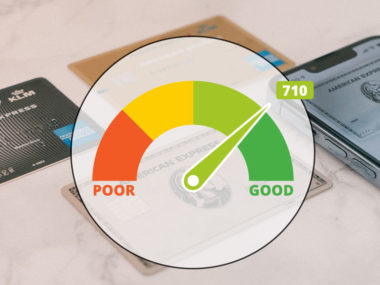FICO’s official classification of credit scores ranks 736 as “Good.” Credit score ranges help indicate how consistently a person practices good credit habits, such as paying off debts on time and keeping credit utilization in the recommended range.
Experian, a credit reporting bureau that uses FICO’s official classification system to measure credit scores, reports that the scoring ranges are:
- 300 to 579: Very Poor;
- 580 to 669: Fair;
- 670 to 739: Good;
- 740 to 799: Very Good;
- 800 to 850: Excellent.
A major part of tracking your credit score is learning what affects your credit score. Although a score of 736 is good, borrowers can easily increase the score into the Very Good category. This article will guide you to a better credit score.
Table of Contents
Why Your Credit Score Is 736
Nearly 21% of borrowers fall within the Good range for credit scores, and roughly half of all borrowers have scores lower than 736. A 736 credit score is good but not great, often showing a mix of credit activity. Borrowers with this credit score most likely have a mix of good and bad credit habits.
Missed Payments
According to Experian, 27% of people with 736 credit scores have late payments in their credit history. When a person has a late payment older than 30 days, creditors will report the late payment to the credit bureaus, dropping the credit score by up to 100 points.
Missing one payment can decrease your credit score and limit your progress if you’re trying to increase your credit score. Your payment history is the largest contributor to your credit score, affecting up to 35% of the total score.
That said, making payments on time can increase your score steadily as creditors report positively to credit bureaus. A person with a 736 credit score is more likely to be up-to-date with their payments than someone in the Fair range.
Length of Credit History
The length of your credit history can affect up to 15% of your credit score. Credit agencies favor accounts that have longer credit histories. Accounts that have been around for 20 years are likely to have higher scores than accounts that are only a few years old (if both accounts practice good credit habits).
If you have near-perfect credit habits and you’re wondering why your score isn’t above 740 and in the Very Good range, your credit history could be at fault — credit histories under seven years old are naturally lower. To remedy this concern, continue to practice good habits and refrain from closing your accounts.
Credit Utilization Rate
Credit utilization affects up to 30% of your credit score. Credit utilization refers to the percentage of available credit you’re currently using. For example, if you have a credit limit of $5,000 and you’re using $2,500, your credit utilization rate is 50%.
Credit score experts recommend that borrowers keep their utilization under 30% to avoid lowering their credit score. If a utilization rate is close to 100%, lenders will be more hesitant to lend money or extend credit.
To remedy this concern, lower your utilization rate by paying off outstanding debts. Lowering your utilization rate can increase your credit score by several points, easily bringing a 736 credit score to 740.
What Can You Do With a 736 Credit Score?
A credit score of 736 has room for improvement; however, it’s good enough for most lenders and credit agencies. A person with a 736 credit score can apply for various credit cards and get good interest rates on loans. Here are seven things you can do with a 736 credit card.
Rewards Credit Card
Rewards credit cards incentivize borrowers by offering cash rewards or convertible points when they make purchases on the rewards card. With a credit score of 736, you can qualify for many of the best rewards credit cards.
No-Annual-Fee Credit Card
For low spenders, cards with annual fees aren’t practical. Luckily, having a high credit score means you’re eligible for a card without an annual fee while still receiving a fair interest rate.
Store Credit Card
Store credit cards are lenient and allow most people to apply. With a 736 credit score, you will have no problems when applying for the store credit card of your choice.
Airline Credit Card
Airline credit cards are strict and won’t consider accepting anyone with a credit score lower than 690. A person with a 736 credit score should be accepted by most, if not all, airlines for a travel rewards card.
Auto Loan With 0% Interest
Auto loans with a 0% interest rate are sought after and valuable. Rather than paying nearly 20% of the vehicle’s value over 20 years, all payments will go directly to financing the vehicle. You must have at least a 720 credit score to be considered for an auto loan with 0% interest.
Apartment Rental
Some apartments require a credit check before letting you sign a contract. By knowing your credit score, the apartment alleviates any risk of missed monthly payments. All apartments will accept credit scores of 736.
Personal Loan
A 736 credit score won’t qualify you for the best personal loan rates. However, a 736 should qualify you for a decent interest rate on personal loans. An acceptable personal loan rate for a 736 credit score is 17%, while low credit score loan rates are around 25%.
How to Improve a 736 Credit Score
For those who have already established good credit habits, increasing your 736 credit score is straightforward if you continue your good habits. However, there are three main things you may not have considered that are holding back your credit score.
Lower Credit Utilization
Higher utilization rates can stop your score from increasing, even if you’re consistently paying off your bills every month. Credit experts recommend having a utilization rate lower than 30%; however, if your utilization rate is higher than 10%, it could limit your credit score.
To have a low utilization rate that benefits your account, aim for a utilization rate between 1% and 10%. Having extremely low utilization should increase your credit score by several points.
Avoid Hard Inquiries
After applying for a new credit card, the credit agency will request your credit report. This action is a hard inquiry and can stay on your credit history for up to two years. A single hard inquiry won’t severely affect your credit score, though it could decrease your score by several points.
When attempting to increase your credit score, avoid applying for new credit cards. If possible, aim to have no more than three hard inquiries in 24 months.
Account Diversity
Credit agencies trust accounts that have high account diversity. A person who can handle multiple account types is more trustworthy because they have more experience. Some examples of account types include:
- Installment loans;
- Bank credit cards;
- Retail credit cards;
- Mortgage loans;
- Airline credit cards.
Having four types of accounts can increase your credit score and prove to agencies that you’re responsible when using credit.
Image Source: https://depositphotos.com/





